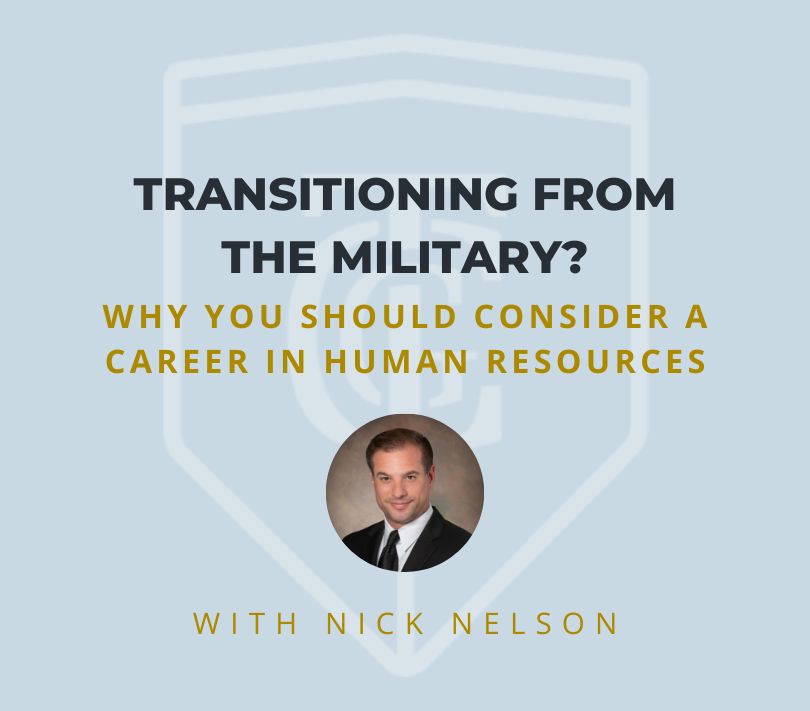Like many other transitioning veterans, when I made the decision to leave military service and enter the civilian workforce, I found myself faced with uncertainty. I had no idea what any civilian career might look like, much less transitioning to a human resources career.
To be honest, I had never really considered that a human resources career for a veteran was a viable option. The HR function in the military tends to be overly transactional, and I assumed HR in the civilian workplace would be similar, but I was concerned about how my experience in the Army would translate to the civilian workplace. All I knew about civilian HR was learned from movies and TV shows which usually portrayed HR professionals as a policing function to their rowdy corporate partners with minimal contribution to the company’s overall success.
 It turns out my concerns were unfounded. When I finished transitioning to my human resources career as a Business Partner at a pharmaceutical manufacturing company, I was pleasantly surprised at the similarities between the HR essential skills and the skills I used as a people leader in the Army. NCOs and Officers in the military perform HR Generalist functions daily without even realizing it. Talent Management? Organizational Development? Performance Management? Collaboration? Learning and Development? These are basic skills for any leader in today’s military and necessary for creating and maintaining a high-performing team.
It turns out my concerns were unfounded. When I finished transitioning to my human resources career as a Business Partner at a pharmaceutical manufacturing company, I was pleasantly surprised at the similarities between the HR essential skills and the skills I used as a people leader in the Army. NCOs and Officers in the military perform HR Generalist functions daily without even realizing it. Talent Management? Organizational Development? Performance Management? Collaboration? Learning and Development? These are basic skills for any leader in today’s military and necessary for creating and maintaining a high-performing team.
So how do these skills translate to the civilian workplace? Turns out, very easily. I’ve found comfort in working with production employees because they reminded me of the Soldiers I used to work with. Applying the basic generalist functions I learned in the military to a manufacturing setting was surprisingly easy and almost natural. In fact, the prioritization of Talent Management, Organizational Development, and Performance Management among military leaders creates an almost “plug-and-play” scenario for the civilian workforce, and every veteran I know who has transitioned into civilian HR has been very successful.
There are functions within HR that will be completely new to a transitioning service member. Time and attendance, payroll processing, and especially comp and benefits were all functions that do not have comparable jobs or duties within the military. To learn those skills, a transitioning service member really will have to start from scratch. Talent Acquisition (TA) is another skill that service members must learn. I’ve found, however, that TA is different that the aforementioned functions, given how easy it was to master. TA in the civilian workplace is much different from recruiting in the military, but it does still seem to come naturally to most transitioned service members. In fact, of all the HR functions, it is the one that I enjoy the most and where I’ve found most of my success.
All in all, a career in human resources should be a consideration during your military career transition. The basic Generalist functions are natural to today’s military leaders and having an immediate seat at the table to utilize the skills learned in the military to drive business success is extremely rewarding.
About Nick Nelson
TCG Recruiting Director
Nick joined the Christopher Group in 2021. Over his career, Nick has worked as a Human Resources leader in multiple manufacturing settings in the Pharmaceutical and Specialty Metals industries. He has experience implementing all aspects of the Human Resources field and specializes in Labor and Employee Relations, Talent and Performance Management, Compliance and Regulations, and Organizational Development.
Nick previously served eleven years as an Active-Duty Field Artillery Officer in the Army before transitioning to the Reserves, where he currently serves as a Major. He has four deployments, most recently to Iraq in support of the US Embassy’s mission or foreign partner capability building, and to Afghanistan as a Special Forces Fire Support Officer. To learn more about Nick Nelson visit his bio page.

